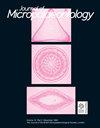A review of the ecological affinities of marine organic microfossils from a Holocene record offshore of Adélie Land (East Antarctica)
IF 1.8
3区 地球科学
Q1 PALEONTOLOGY
引用次数: 16
Abstract
Abstract. Integrated Ocean Drilling Program (IODP) Expedition 318 recovered a ∼ 170 m long Holocene organic-rich sedimentary sequence at Site U1357. Located within the narrow but deep Adélie Basin close to the Antarctic margin, the site accumulated sediments at exceptionally high sedimentation rates, which resulted in extraordinary preservation of the organic sedimentary component. Here, we present an overview of 74 different mainly marine microfossil taxa and/or types found within the organic component of the sediment, which include the remains of unicellular and higher organisms from three eukaryotic kingdoms (Chromista, Plantae, and Animalia). These remains include phytoplanktonic (phototrophic dinoflagellates and prasinophytes) and very diverse zooplanktonic (heterotrophic dinoflagellates, tintinnids, copepods) organisms. We illustrate each marine microfossil taxon or type identified by providing morphological details and photographic images, which will help with their identification in future studies. We also review their ecological preferences to aid future (palaeo)ecological and (palaeo)environmental studies. The planktonic assemblage shows a high degree of endemism related to the strong influence of the sea-ice system over Site U1357. In addition, we found the remains of various species of detritus feeders and bottom-dwelling scavengers (benthic foraminifers and annelid worms) indicative of high export productivity at Site U1357. This study shows the potential of organic microfossil remains for reconstructing past environmental conditions, such as sea-ice cover and (export) productivity.阿德利地(南极洲东部)近海全新世记录海洋有机微体化石的生态亲缘关系综述
摘要综合海洋钻探计划(IODP)远征318号回收了 ∼ 170 U1357场地的m长全新世富有机质沉积序列。该地点位于靠近南极边缘的狭窄但深的阿德利盆地内,以极高的沉积速率积累沉积物,从而使有机沉积成分得到了非凡的保存。在这里,我们概述了沉积物有机成分中发现的74种不同的主要是海洋微体化石分类群和/或类型,其中包括来自三个真核生物界(Chromista、Plantae和Animalia)的单细胞和高等生物的遗骸。这些遗迹包括浮游植物(光养甲藻和原生植物)和非常多样化的浮游动物(异养甲藻、丁目、桡足类)。我们通过提供形态学细节和照片图像来说明每一个海洋微体化石分类单元或类型,这将有助于在未来的研究中识别它们。我们还回顾了它们的生态偏好,以帮助未来的(古)生态和(古)环境研究。浮游生物组合显示出高度的地方性,这与U1357场地海冰系统的强烈影响有关。此外,我们还发现了各种碎屑食性动物和底层清道夫(底栖有孔虫和环节虫)的遗骸,表明U1357场地的出口生产力很高。这项研究显示了有机微体化石遗迹重建过去环境条件的潜力,如海冰覆盖和(出口)生产力。
本文章由计算机程序翻译,如有差异,请以英文原文为准。
求助全文
约1分钟内获得全文
求助全文
来源期刊

Journal of Micropalaeontology
生物-古生物学
CiteScore
4.30
自引率
5.00%
发文量
7
审稿时长
>12 weeks
期刊介绍:
The Journal of Micropalaeontology (JM) is an established international journal covering all aspects of microfossils and their application to both applied studies and basic research. In particular we welcome submissions relating to microfossils and their application to palaeoceanography, palaeoclimatology, palaeobiology, evolution, taxonomy, environmental change and molecular phylogeny.
 求助内容:
求助内容: 应助结果提醒方式:
应助结果提醒方式:


